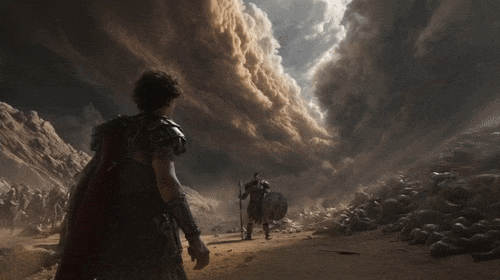
Picture him: a boy alone in the pastures, nothing but sheep and sky and silence. No audience. No applause. Just a kid doing work that nobody sees, caring for creatures that can't say thank you.
His hands are learning two languages at once: the gentle touch that bandages a lamb's wounded leg, and the fierce grip that breaks a predator's jaw.
Out there, where no one's watching, he's becoming something our world has almost forgotten how to make: a man whose strength exists to protect, not to prove.
The Psalms catch this beautiful contradiction in a single breath: "You teach my hands to war, so that my arms can bend a bow of bronze." (Psalm 18:34)
This is a man trained for violence, hands calloused from the bowstring, muscles memory-mapped for battle.
But listen to what else he says: "You have collected all my tears in Your bottle."
When was the last time you heard a warrior speak of his tears.
David didn’t see his emotions as weakness to hide, but as something precious enough for God to collect.
That's David. That's the hero we've lost and desperately need to find again.

Here's what we've forgotten: real strength doesn't harden the heart. It guards it.
David didn't fight because he loved violence. He fought because he loved his sheep too much to let them be torn apart.
The same hands that cradled newborn lambs could shatter a lion's skull. The same voice that sang lullabies to calm a frightened flock could roar defiance at a giant mocking God.
This is what true heroism looks like: not domination, but devotion. Not power for its own sake, but power in service of love.
We're raising boys in a world that's terrified of this balance.
We tell them to be tough, but we mean be numb.
We tell them to be strong, but we mean don't feel.
We've traded the hero's heart for the warrior's mask, and we're all poorer for it.
We've created men who can throw punches but not comfort the hurting, who can win arguments but not tend wounds, who can build empires but not protect souls.
David shows us there's another way.

David’s holiness wasn't the sterile, distant kind. His holiness was alive. It sweated in the desert. It bled in battle. It wept over broken friendships and buried children. It fell to its knees in the dirt and cried out to God with a voice raw from screaming.
Read the Psalms and you'll hear it. You’ll hear the sound of a man who's been shattered and somehow, impossibly, is letting God put the pieces back together.
Every verse carries the weight of real life: the metallic taste of fear before battle, the crushing guilt of moral failure, the howling grief of losing a son who died hating you.
These aren't the polished words of someone who's figured it all out… They're the broken prayers of someone who keeps coming back to God, again and again…
Even after he's fallen,
Even when he's ashamed,
Even when the crown feels too heavy and the guilt too deep.
David returns…
"Create in me a clean heart," he begs after his catastrophic failure with Bathsheba. Not "Let me hide this" or "Help me justify myself.”
That's the hero we need. Not the one who never falls, but the one who rises.
Not the one who's never broken, but the one who lets God mend him.
Not the perfect, untouchable champion on a pedestal, but the limping, scarred warrior who keeps walking toward the light.
Because every one of us is David at some point. We've all tended sheep we loved and failed people we cherished.
We've all faced giants that made us feel small and wrestled with guilt that seemed stronger than we are.
We've all needed to be both gentle and fierce, to hold tenderness and strength in the same trembling hands.
WE'RE ANIMATING OUR NEWSLETTERS!
Check them out before anyone else by going to our channel at PRAY.COM
Plus, you'll find more resources to build your faith, right from your phone.

What if heroism isn't about being invincible? What if it's about being whole.
What if being a hero meant carrying both the harp and the sling, both the tear and the battle cry, both the wound and the will to keep going?
Our world is choking on shallow strength. We're surrounded by men who mistake cruelty for courage, who confuse coldness with competence, who think vulnerability is weakness and compassion is compromise.
We've lost the language David spoke fluently: the dialect that understands you can weep over your enemy's death and still know the fight was necessary.
You can be gentle with the hurting and fierce with the predator.
So when you feel caught between softness and steel, remember the shepherd-boy in the field.
Holiness doesn't mean choosing between compassion and courage… it means embodying both at all costs.
God isn't looking for men who can't feel. He's looking for men who feel so deeply they're willing to fight for what matters—and brave enough to weep for what's lost.
That's the hero our hearts are searching for.
That's why we still need figures like David to look to.
